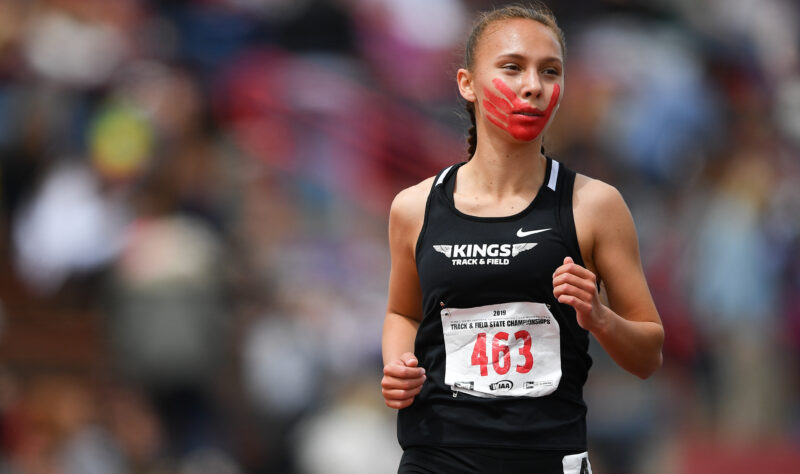Rosalie Fish

(Photo by Tyler Tjomsland/The Spokesman-Review)
University of Washington’s long-distance runner and Indigenous people’s advocate
“Running with the paint changed my life.” Long-distance runner and activist Rosalie Fish first made international headlines when she ran a high school track & field event with a red handprint painted over her mouth, symbolizing the Indigenous women who were silenced by violence and “MMIW” painted on her leg to raise awareness of the Missing and Murdered Indigenous Women epidemic impacting her community and the country. What makes her deserving of the Women’s Sports Foundation’s Wilma Rudolph Courage Award, is her persistence, resilience and bold determination to get society to pay attention to a crisis often cast to the shadows and her desire to be a face of change for a safer, more just world.
Born in Auburn, Washington, Fish is a member of the Cowlitz Tribe, of Muckleshoot heritage, who grew up on the Muckleshoot Reservation. She first began running in middle school and quickly discovered its unique power to connect to her surroundings and ancestral roots. Running also helped her cope with the violence ravaging Indigenous women in the United States – with murder being the third leading cause of their death, acts of violence reported at alarming levels, and perpetrators often not being held accountable. Fish is a survivor of violence who attempted to take her own life when she was 14. She credits her family’s love for helping her through that difficult time and running for giving her a sense of purpose to live for others when she didn’t have the strength or confidence to live for herself.
Inspired by Boston Marathon runner and Lakota activist Jordan Marie Daniel, Fish first donned the handprint and MMIW lettering at her state championships in 2019, where she dedicated all four of her races to Indigenous women who have gone missing or have been murdered, providing photos and information about them on a poster. One of them was her aunt, Alice Ida Looney, who disappeared when Fish was two-years-old and was found dead 15 months later. Fish won each of her races that day. Though her victories did not change what happened to the women she chose to honor, it did place a national spotlight on an issue that receives minimal visibility.
Over time, racing for MMIW has become a form of empowerment for Fish who is now more comfortable and confident using her platform to bring attention to this epidemic that has directly impacted her and her loved ones.
Fast forward to today and 22-year-old Fish has a long list of accomplishments to be proud of. In 2019, she became the first member of her tribe to sign a National Letter of Intent for college athletics when she committed to Iowa Central Community College following numerous Washington state track titles at the 1B level. In 2021, she was recruited by the University of Washington’s (UW) track & field team and in 2022 she became the first Husky student-athlete to win a Truman Scholarship, awarded nationwide to students based on leadership skills and who have demonstrated civic engagement, academic potential and a desire to pursue a career in public service.
From the track to the classroom, she plans to continue her advocacy for all Indigenous people at UW by pursuing a Master of Social Work and graduate certificate in American Indian Studies.
Learn more about the Missing and Murdered Indigenous Women MMIW epidemic and take action. Visit and support the Urban Indian Health Institute at www.uihi.org.
